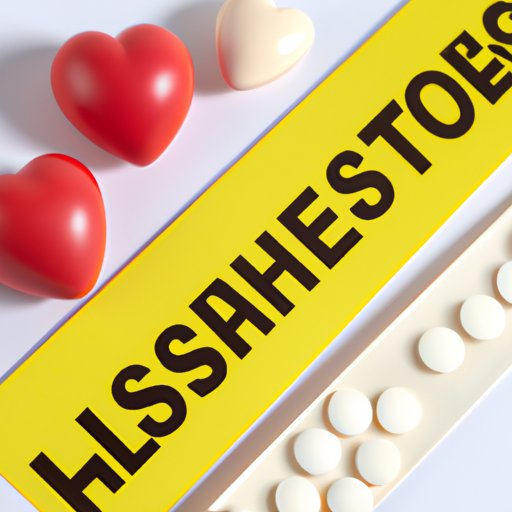Introduction
Cholesterol is a waxy, fat-like substance that is produced by your liver and found in certain foods. While cholesterol is important for many bodily functions, such as hormone production and cell structure, high levels of Low-Density Lipoprotein (LDL) cholesterol can contribute to heart disease risks. LDL cholesterol is also known as “bad” cholesterol because it can build up in the walls of your arteries, leading to blockages and heart attacks. However, the good news is that there are many strategies to help manage LDL cholesterol levels, including dietary changes, exercise, weight control, medication, and other lifestyle changes.
Diet Changes
One of the most effective ways to lower LDL cholesterol is to make dietary changes. Adopting a healthy diet can help reduce the risk of heart disease and also improve overall health.
One way to lower LDL cholesterol levels is to increase your fiber intake. Fiber-rich foods, such as whole grains, fruits, and vegetables, can help reduce cholesterol absorption in the bloodstream. Aim for at least 25-30 grams of fiber per day.
Eating healthy fats, such as those found in fish, nuts, and avocado, can also help manage cholesterol levels. On the other hand, trans fats and saturated fats should be limited in the diet, as these types of fats can raise LDL cholesterol. Foods that contain trans fats include fried foods, pastries, and processed snacks, while saturated fats are found in animal products like meat and dairy.
Here are some examples of foods that are good for LDL cholesterol management:
- Avocado
- Oats
- Fatty fish (salmon, mackerel, etc.)
- Nuts and seeds (almonds, walnuts, chia seeds, etc.)
- Leafy greens (spinach, kale, etc.)
- Legumes (lentils, beans, etc.)
- Whole grains (brown rice, quinoa, etc.)
- Fruits (berries, apples, etc.)
- Vegetables (broccoli, cauliflower, etc.)
Regular Exercise
Physical activity is not only important for healthy weight management, but it can also help lower LDL cholesterol levels. Regular exercise helps to strengthen the heart and improve blood circulation.
When it comes to lowering LDL cholesterol, aerobic exercise is best. Aerobic activities, such as swimming, cycling, running, or brisk walking, can help raise HDL (“good”) cholesterol and lower LDL cholesterol levels.
Try incorporating at least 150 minutes of moderate-intensity exercise or 75 minutes of vigorous exercise per week. This can be divided into shorter sessions, such as 30 minutes per day, five days per week.
Weight Control
Being overweight or obese can contribute to high LDL cholesterol levels. Losing weight and maintaining a healthy weight through diet and exercise can help manage cholesterol levels and improve overall health.
Here are some tips on how to lose weight and maintain a healthy weight:
- Eat a balanced diet with plenty of fruits, vegetables, and whole grains
- Avoid sugary and processed foods
- Limit portions and practice mindful eating
- Stay hydrated by drinking plenty of water
- Engage in regular physical activity, such as brisk walking, running, or swimming
Avoid Smoking and Alcohol
Smoking and excessive alcohol consumption can increase the risk of heart disease and raise LDL cholesterol levels. Quitting smoking and limiting alcohol consumption can be beneficial for cholesterol management and overall health.
Here are some tips to help quit smoking and avoid alcohol abuse:
- Seek support from friends, family, or a healthcare professional
- Join a support group or counseling program
- Avoid triggers, such as certain social situations or stressors
- Limit alcohol intake to one drink per day (for women) or two drinks per day (for men)
- Choose non-alcoholic drinks instead of alcoholic ones
Medications
For some individuals, prescription medications may be necessary to manage cholesterol levels. Some of the commonly prescribed medications to lower LDL cholesterol include statins, bile acid sequestrants, and PCSK9 inhibitors. If prescribed medication for high cholesterol levels, it is important to speak with a healthcare provider about the potential benefits and side effects of the medication.
Lifestyle Changes
In addition to the above-mentioned strategies, there are also lifestyle changes that can help manage LDL cholesterol levels and improve overall heart health.
For example, reducing stress through mindfulness meditation or deep breathing exercises can help lower LDL cholesterol levels. Increasing fiber intake through supplementation or increasing fruit and vegetable intake can also be beneficial. Other lifestyle changes include avoiding processed foods, getting enough sleep, and staying hydrated.
Conclusion
Lowering LDL cholesterol levels is an important part of heart health and can help reduce the risk of heart disease. By making dietary changes, exercising regularly, maintaining a healthy weight, avoiding smoking and excessive alcohol consumption, and potentially taking medication, LDL cholesterol levels can be managed effectively. Adopting a healthy lifestyle can help manage cholesterol levels for more extended periods and improve overall health in the long run. Consult your healthcare professional to achieve a comprehensive program suited to your individual circumstance.
